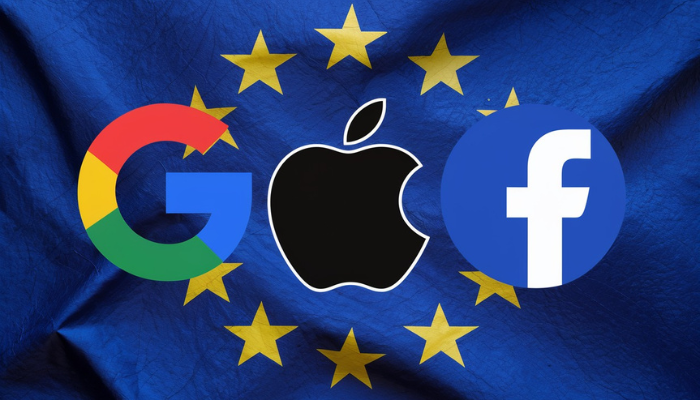EU probes Apple, Meta, Google under new law
3 min read
Tech companies could incur significant fines for violating the Digital Markets Act
The EU is investigating Apple, Google’s parent company Alphabet, and Meta for potential violations of the bloc’s new laws aimed at regulating anti-competitive behavior by major technology firms.
If found guilty of breaching the Digital Markets Act (DMA), the three companies could face substantial fines. The DMA, which became effective on March 7, is intended to enhance choice for online consumers.
The European Commission, the EU’s executive body, is examining potential breaches including: Apple and Google’s practices allowing app developers to direct users to offers outside their app stores; whether Alphabet favors its own services, such as Google Shopping, in search results on its search engine; Meta’s introduction of fees for an ad-free experience on Facebook and Instagram, and its compliance with DMA provisions on users’ personal data; and whether Apple is facilitating users’ selection of alternative browsers on their phones.
“The commission suspects that the measures implemented by these gatekeepers do not fully comply with their obligations under the DMA,” stated the commission.
The law mandates the six tech “gatekeepers” – Alphabet, Amazon, Apple, Meta, Microsoft, and ByteDance (the owner of TikTok), which provide services such as search engines, social networks, and chat apps used by other businesses – to adhere to guidelines ensuring fair competition for their competitors and offering users more options.
Thierry Breton, the commissioner for the internal market, warned that the companies could face “substantial fines” if they were found to have violated the act.
“The Digital Markets Act became effective on 7 March,” he stated. “We have been engaging in discussions with gatekeepers for months to assist them in adjusting, and we are already witnessing changes in the market. However, we are not persuaded that the approaches taken by Alphabet, Apple, and Meta adhere to their obligations to create a fairer and more transparent digital environment for European citizens and businesses.”
Competition Commissioner Margrethe Vestager remarked that the companies had ample time to adhere to the act, emphasizing that the commission had collaborated with them to ensure compliance.
“I don’t believe this has been rushed,” Vestager informed reporters. She explained that the purpose of the new laws was not to initiate cases but to offer consumers the choices they deserved under competition laws.
“The sooner we see changes, the sooner consumers can benefit from the DMA,” she stated. Vestager noted that the EU had established “strong deterrents” to encourage tech companies to fulfill their obligations, including substantial fines for those that did not meet the required standards.
Failure to comply with the DMA can lead to fines of up to 10% of turnover, increasing to 20% for repeated violations. Apple’s annual revenue last year was $383 billion, while Alphabet’s was $307 billion, and Meta’s was $134 billion.
Additionally, the commission is investigating Apple’s new fee structure for alternative app stores and Amazon’s ranking practices on its marketplace. The EU executive intends to complete these investigations within a year, as outlined in the DMA.
Anne Witt, a professor of antitrust law at EDHEC business school in France, remarked that the commission had acted swiftly to enforce the act. “The commission has certainly not hesitated to initiate these investigations, given that the DMA’s conduct rules only began to apply to gatekeepers in early March. This is a major test for the DMA,” she stated.
Max von Thun, the Europe director of the Open Markets Institute, which examines the impact of corporate monopolies, suggested that the commission should also be prepared to utilize non-financial penalties permitted under the act, such as mandating the divestiture of parts of a business.
“The commission should not shy away from imposing substantial fines on the gatekeepers and leveraging other potent sanctions outlined in the DMA, such as structural divestiture and bans on acquisitions, where necessary to ensure compliance,” he stated.
A spokesperson for Meta stated that the company believed its practice of offering ad-free versions of its platforms for a fee was in accordance with the act. “We developed the ‘subscription for no ads’ feature to address several overlapping regulatory requirements, including those of the DMA,” they explained.
Google, which stated that it had implemented significant alterations to its services, expressed its intention to defend its approach in the upcoming months. Apple expressed confidence that its strategy complied with the DMA.



